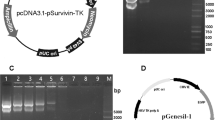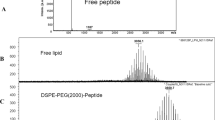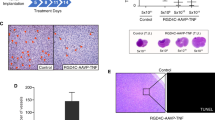Abstract
Endothelial cells are a promising target for cancer gene therapy because neoangiogenesis is vital for the supply of oxygen and nutrients to solid tumours. However, endothelial cells have been reported to be difficult to transfect. We demonstrate high rates of transfection with the reporter gene pSV40βgal using DC-Chol/DOPE cationic liposomes and lower rates with the novel polyamine cationic lipo- somes ACHx/DC-Chol/DOPE and ACO/DC-Chol/DOPE. Endothelial cells transfected with HSV-thymidine kinase using DC-Chol/DOPE demonstrated 3 log10 increased cytotoxicity compared with controls when exposed to the prodrug ganciclovir, thereby demonstrating significant biological effect.
This is a preview of subscription content, access via your institution
Access options
Subscribe to this journal
Receive 12 print issues and online access
$259.00 per year
only $21.58 per issue
Buy this article
- Purchase on Springer Link
- Instant access to full article PDF
Prices may be subject to local taxes which are calculated during checkout
Similar content being viewed by others
Author information
Authors and Affiliations
Rights and permissions
About this article
Cite this article
Fife, K., Bower, M., Cooper, R. et al. Endothelial cell transfection with cationic liposomes and herpes simplex-thymidine kinase mediated killing. Gene Ther 5, 614–620 (1998). https://doi.org/10.1038/sj.gt.3300627
Received:
Accepted:
Published:
Issue Date:
DOI: https://doi.org/10.1038/sj.gt.3300627



